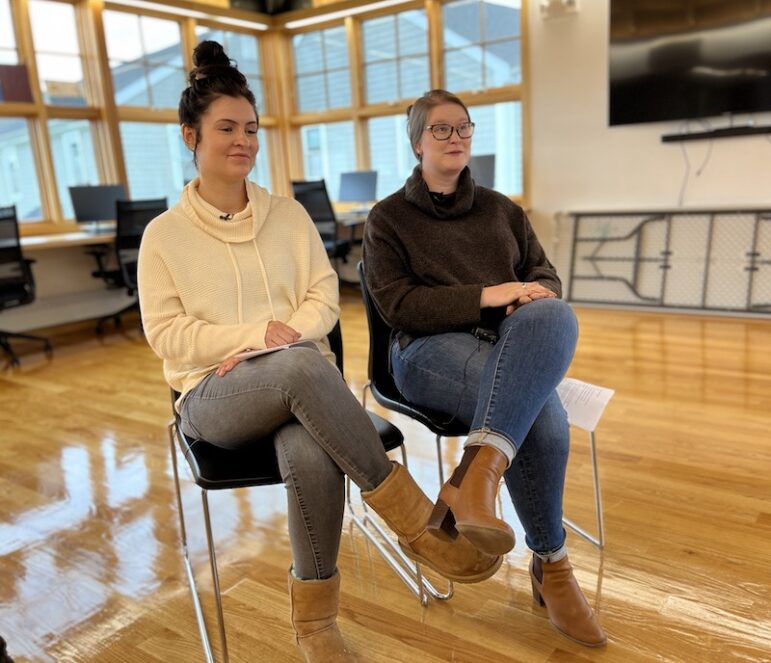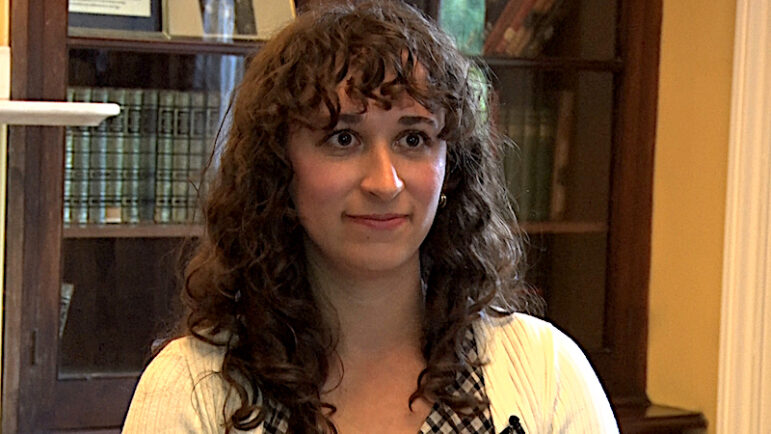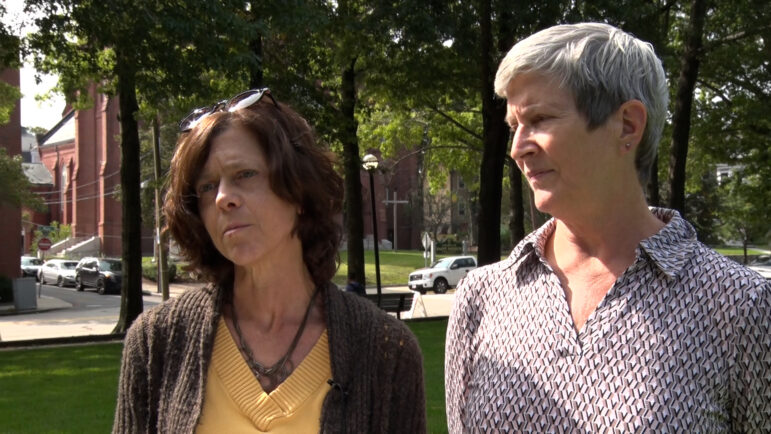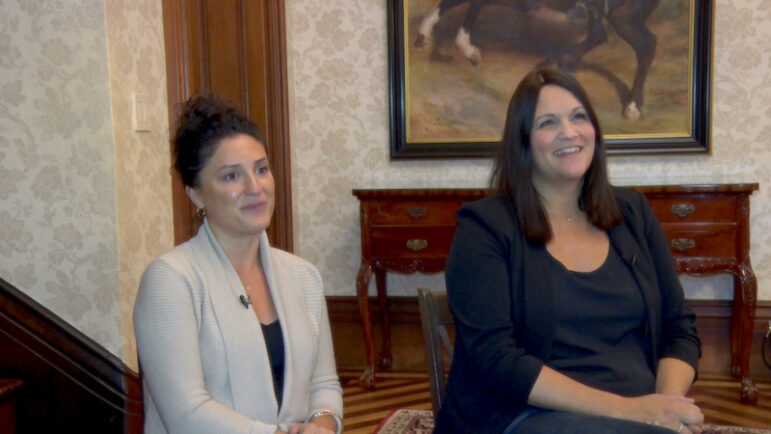
As the numbers of people facing a scarcity of food, worried about losing their home, or paying for utilities rose at the start of the Pandemic, a group of people in Watertown was gathered to bring together their knowledge of how to serve those in need.
The task force continues to meet regularly, and tries to figure out ways to fill the gaps and patch the cracks in the local, state, and federal social services programs.
This story is the third in a series by Watertown News, in conjunction with Watertown Cable Access Television, called “Watertown’s Hidden Problem: Food Insecurity Among Us.” (See part one here).
The Task Force
Jan Singer, who was executive director of the Watertown Community Foundation when COVID-19 hit, said the Community Resilience Task Force came about when the Foundation got a grant from the Massachusetts COVID-19 Relief Fund aimed at providing assistance in key areas such as housing, childcare, and food security. Singer and members of the Foundation board quickly realized that they needed to gather the experts to help them direct the funds where they were needed most.
Working with service providers so close to ground level was a new experience for Singer.
“While creating this task force I felt like I became a social worker, in a way that I had never, and a role the Foundation never served before,” she said. “We were always one step away. We were the grant givers — that’s what a foundation does. In this case we needed to be front and center and know what was going on in the community and so it was incredibly eye opening for everybody on the board of the Foundation. It was eye opening for a lot of Town leaders, because they didn’t understand there were people in Watertown going hungry. They didn’t understand that there were people in Watertown who were homeless.”
The Community Resiliency Task Force is named for the fund created by the Community Foundation during the Pandemic. In the beginning, Singer brought in the City’s Director of Community Development and Planning, Steve Magoon, and then-Watertown Boys & Girls Club Executive Director Renee Gaudette, along with some of the social service providers in Watertown. It grew from there.
The first efforts of the task force focused on getting masks to people and supplies to homes where someone had tested positive for COVID, Singer said. What started as a temporary response during a time of crisis has become a fixture.
“It almost was going to end earlier this year and everyone was like, ‘Oh, no! We need to continue this,'” Singer said. “It may not be for the same exact reason, but we need to know what each other are doing. What was great is people started working together in different ways than they had been in the past.”
Now the group focuses on more day-to-day issues that service providers see in the community, said Olivia Fields, Director of Resident Services at the Watertown Housing Authority, who is part of the group.
“What resources do you have? What is a gap that you have? And we bring it to this group of a variety of providers — all the way from (the affordable housing non-profit) Metro West Collaborative to the Senior Center, the Housing Authority, SSRS (the Social Services Resource Specialists at Wayside), the Library; all of our resources coming together to put our heads together to find these gaps or these resources that we can then distribute to our constituents,” Fields said.

The SSRS program began as a public-private partnership with funding from a number of sources, including the Helen Robinson Wright Fund at the First Parish Church, the Watertown Community Foundation, Mount Auburn Hospital, said the Wayside Multi-Service Center‘s Sophia Suarez-Friedman, who is one of the City’s Social Services Resource Specialists. Now it is funded by the City of Watertown
People can go to the SSRS program for help in a number of areas, and they can get some help directly from SSRS or may be referred to another group or program in the area. Suarez-Friedman splits the load with Maysa Ramos to make up one full-time position. Wayside recently received approval for a funding request from the City’s American Relief Plan Act (ARPA) dollars to add another 40 hours a week to the SSRS program, in order to meet the growing need.
People often find out about the SSRS program through friends, neighbors or family members. Other social services organizations and City departments will also sent people their way.
“We get referrals from a lot of other community groups and the City itself,” Suarez-Friedman said. “Town Hall and the Health Department sends us referrals and then we are constantly collaborating with, and getting referrals from the Housing Authority, the Watertown Police clinician, the Food Pantry, the schools, and the list goes on.”
The Housing Authority serves some of the lowest income residents in Watertown, who are at or below 30 percent of the Average Median Income of the area — $44,520 a year for a family of four. Fields said the WHS turns to the SSRS for a variety of things.
“We have a very close relationship with them, so if we have an individual in a very tight position,” Fields said. “Maybe they are moving in from shelter and I am helping with a furniture referral but may be they don’t have enough to fill in the fridge or to purchase a fridge — which is a huge component to food security which I don’t think a lot of people think of — the Social Services Resource Specialist will connect us to some of their resources for a fridge or a food gift card if somebody is in a pinch.”
When people are lacking food, it is rarely the only struggle they are facing, Suarez-Friedman said.
“Food is in our top three areas (of concern). We are working with people around housing, rental assistance, utility assistance and other financial needs, and food,” Suarez-Friedman said. “One thing that I like to talk about, when I talk about the work that I do and when I’m talking to client, is that if they are coming to me for housing, they are getting priced out of their apartment, or if the can’t pay their utility, or the can’t pay their rent, we are going to talk about food, as well. We are going to talk about all their expenses, because you can’t talk about one without talking about the other.”

The SSRS program serves people age 19 to 59 in Watertown. Those older can access programs through the City’s Department of Senior Services, which also oversees the Senior Center and the Watertown Food Pantry. Those younger can receive services or referrals from the Watertown Public Schools. The people on the frontline for the schools are the Community Outreach Counselors, Jaimie Swift and Stephanie Toyias.
The Counselors typically hear about a student or family in need from a guidance counselor or a teacher. Sometimes they use one of the school’s Family Liaisons to help them make initial contact if the family’s first language is not English, Swift said.
“We just try to assess the needs the best way we can, and if it is specifically food, and they have some food need we try to work quickly on that because it’s something you need to survive,” Swift said. “We have great relationships with the food pantries in town (the Watertown Food Pantry and the Catholic Collaborative Food Pantry). I can call either one of them or (Toyias) can call either one of them when they are open. They are so generous. We can deliver it right away.”
Government Assistance
That will help meet the immediate need, Swift said, but the long-term solution for many people is signing them up for SNAP (Supplement Nutrition Assistance Program, formerly called Food Stamps).
Toyias and Swift will also tell them about the food pantries and the Watertown Community Fridge, which is located outside the United Methodist Church at 80 Mt. Auburn St. and the food is free to take (or donate) 24 hours a day, seven days a week.
Earlier this year, Swift was headed over to the Food Pantry when she saw a group of people to whom she had given information about how to use the pantry.
“They were walking back from there and I said, ‘That’s it!,'” she said. “We gave them the information and they did it all by themselves. That’s the best case scenario. We can teach them and the do it. They access the resources. That was a fun moment for us.”
The City of Watertown has put an emphasis ons spreading the word about the SNAP program, and making it easier for people to sign up, said Stephanie Venizelos, the City of Watertown’s Community Wellness Program Manager for the City of Watertown.
“There are lots of ways people learn about SNAP. It could be word of mouth, it could be a social worker, and if someone is a senior citizen the caseworker at the Senior Center,” Venizelos said.

Information about SNAP is available at the Watertown Farmers Market, which Venizelos manages. By signing up for the program, people can also take advantage of HIP (Healthy Incentives Program), which gives people money to use at the Farmers Market. Each day the market is open, people can get up to $15 in matching SNAP dollars to use at the market. The HIP funds are $40 to $80 a month, depending on family size. The benefits can be used on produce and some of the specialty vendors, but not the ready-to-eat meals, Venizelos said.
The system can be a bit confusing, Venizelos said, so she recommends SNAP users visit the Market Manager’s Table to learn how to use the SNAP match and HIP. She also visits the Watertown Housing Authority when the Farmers Market delivers groceries once a month during Market Season.
Fields said that WHA residents feel more comfortable using SNAP and HIP benefits at the Farmers Market after hearing from Venizelos.
“It does take the anxiety out if you know who you are going to see at the Farmers Market and know how to use your HIP and SNAP benefits appropriately,” Fields said. “Then they can actually access this fresh food. It removes that barrier.”
When COVID hit, the Watertown Public Schools continued to provide free meals to students who qualified. Students could pick up breakfast and lunch three days a week from the high school, and the district extended the program through the summer of 2020.
The Watertown Public Schools, and all public schools in Massachusetts, now provide free meals for every student after the governor approved funding for the the universal free school meals program in August 2023. Under the old program, families would have to apply for the Free or Reduced School Meals program, and Toyias said for some there was a stigma using the program.
“(Students would) have to go to the cafeteria to get the free lunch and I think kids were embarrassed, so there was a whole other host of things with that set up,” Toyias said. “Now that it is available to everybody, I think a whole lot more families and kids are taking advantage of that, and so it’s helpful. It fills the gap of students in school who were hungry. It’s hard to focus on your classwork when you haven’t had breakfast or haven’t had lunch. … I would think and hope it’s helping to alleviate a family’s burden of providing food for their kids during the day. And they can focus on diner time and weekend stuff, so it takes a little bit of the pressure off there.”
Gaps and Barriers
Other barriers exist, however, preventing people from using or qualifying for SNAP benefits, or even visiting the food pantries and the Community Fridge. Also, the need has grown, said Suarez-Friedman.
“Before the Pandemic (food insecurity) just wasn’t something we were talking about a lot, and it felt like SNAP benefits were enough to just fill the need,” she said. “I think since the pandemic we have had to think a lot more creatively about filling that need, and that’s continued.”
For some people, such as some non-citizens and all undocumented immigrants, they are not eligible for SNAP. Though if the children in the family are citizens, they can qualify for benefits for them, but not the whole family, Suarez-Friedman said.
Some people fall in between the allowable income to qualify for SNAP and the rising cost of putting food on the table, Fields said.
“Specifically talking about our family developments, I find, there is in this gap where their income is slightly more than what would qualify for SNAP benefits and in turn HIP benefits, but not high enough where they are able to sustain the rising grocery costs,” Fields said.
To qualify, the maximum income for a single person before taxes is $29,160, and $60,000 before taxes for a family of four, according to the SNAP website.
Families living in the Watertown Housing Authority can take part in a program where they get grocery deliveries once a month, via a grant from the Watertown Community Foundation. They receive about $125 worth of groceries from Roche Bros. During the Farmers Market season, June to October, they also receive a delivery from the Farmers Market during another week during the month.
Those who do not live in the Watertown Housing Authority cannot take advantage of those programs, Swift notes. And those programs will likely be ending in the not so distant future because they were funded by Pandemic Relief Funds.
“The gap exists for families that do not live in (public) housing in Watertown and don’t get SNAP,” Swift said. “They will rely on the food pantry. The food pantries are already busy all the time, but often (people) can’t get there. It is either because of transportation issues, or it is because they are working. Our food pantries in Watertown are open during the day.”
The Watertown Food Pantry, at 80 Mt. Auburn St., is open on Tuesdays from 10 a.m. to 2 p.m. While the Catholic Collaborative Food Pantry, at Sacred Heart Church, 770 Mt. Auburn St., operates on Thursdays from 10 a.m. to 11:45 a.m.

Other times of year, particularly around Thanksgiving or the holiday season, families in need will receive some additional help, Swift said.
“The Watertown Public Schools do a really good job around Thanksgiving. Both the Watertown Middle School and Watertown High School do Thanksgiving baskets for families in need,” Swift said. “School counselors and teachers will identify families in need and the communities at each school will come together and put together baskets — the students participate.”
The baskets go to between 60 and 70 families with students at Watertown’s public elementary, middle, and high schools, Swift said. At Christmas, the Watertown Police Department’s Sonny Whooley Foundation, donates meals to dozens of families, too, Swift said, along with delivering gifts to 100s of children in the community.
Even those who qualify may struggle to apply for SNAP, if they are not tech savvy or lack access.
“Where families get stuck in the red tape of SNAP and DTA in general, if you don’t have a computer or smartphone to upload the documents quickly, they use fax, still, or mail,” Fields said. “Those sorts of issues may seem very small, but it could mean cancelling somebody’s SNAP application and they would need to reapply. Small things like that, myself and our part time case manager see frequently.”
When working with families, the School Outreach Counselor sometimes encounter those who cannot read or write, even in their first language, Toyias said.
“Or, they are not necessarily tech literate,” she said. “I’ve helped a family get an email for the first time. So, there are some barriers for people: the access, following up on their applications, and maintaining their services (online).”
Kristen Monti, Director of Operations at the WHA, said she has also heard of some residents who choose not to use SNAP.
“They will say, ‘There’s someone who needs it more than I do,'” Monti said. “So, they will remove themselves from the program, but they still meet the criteria and should be taking advantage of any programs they may be eligible for. But that is something that I have heard from a few tenants.”
Possible Solutions
When asked what could be done to set up a more permanent fix to some of the gaps, members of the Community Resilience Task Force saw some possibilities.
When the School Outreach Counselors hear about a family in need of food, that does not have access to transportation or cannot make it to the Food Pantries because they are working, the Counselors will make deliveries, Swift said.
“I will talk with Kathy (Cunningham at the Watertown Food Pantry), I will talk with Carol (Pennington at the Catholic Collaborative Food Pantry), and I will say, ‘This is what we have,'” Swift said. “They are so generous, they are so giving. That is not sustainable. That is not a program. That is a Band-Aid and it’s a quick fix because we want to make sure our students are fed.”
Just looking at the families that they work with, however, Toyias said that they could not possibly do food delivery to all of them.
“There’s only two of us. We could be doing this all day …,” Toyias said. “There would need to be way more people involved.”
Swift said that she believes the town has the will to do something, but it would have to be organized.
“What I will say about the spirit of the town is people are really generous here. People want to help and so I think there probably is an opportunity for this town to fill the gap, but I think it would take a lot of people around the table,” Swift said. “It would take the community collaborating with the Food Pantries, with volunteers, possibly the churches, to fill that gap. I see it as volunteers being willing to drive to deliver food.”
In other communities, the food pantries and other groups go beyond just providing food, Venizelos said.
“Arlington Eats, for instance, and there are many out of Greater Boston that are doing programming. So, healthy eating, cooking, community meals, and things along those lines,” Venizelos said. “One of our program facilitators is affiliated with (Mass. General Hospital) and Revere just opened a food pantry and they are doing food as medicine programming and all kinds of wonderful things. So, there are lots of ways you can connect your efforts, and we know that food insecurity and housing are very interrelated on all different levels, and different degrees of need.”
Singer said before she stepped down from the Community Foundation in 2022, she met with the new City Manager, George Proakis, and recommended that the City start permanently funding food security efforts for residents.
“Cambridge has done this great thing. They have given a five year grant for food security, partly from their (ARPA) funds and partly from the funds they received, and so they have a plan. They have a five year plan which is great,” Singer said. “That would be great if Watertown could do something like that but it is going to take more than just the Community Foundation to do that, it is going to take coordination with other funding that the City has.”
In early December, the City Council funded 18 projects with the City’s $10.7 million in ARPA funds, some of which focus on food security, including $60,000 will be spent to help run the Watertown Community Fridge.
The biggest grant focused on food security went to the Watertown Food Pantry. The City Council approved using $152,000 in ARPA grant funds to pay for the Pantry to move to the Parker Building on Watertown Street, said Watertown Director of Senior Services Lydia McCoy. At that location the Food Pantry will be able to offer more hours and more services. McCoy added that the current location, at the United Methodist Church, will soon be renovated, but when it is done the City is considering having a satellite location there.
In coming weeks, the series by Watertown News and WCA-TV will look deeper at the Watertown Food Pantry and the Watertown Community Fridge, and will explore other ideas that other communities have had to tackle hunger. The series is made possible, in part, by a grant from the Watertown Community Foundation.
(Watertown News Contributing Writer Maya Shwayder contributed to this story).
Resources
Watertown Food Pantry: 80 Mt. Auburn St. (rear of the Belmont-Watertown United Methodist Church), uesdays from 10 a.m. to 2 p.m. https://www.watertown-ma.gov/330/Watertown-Food-Pantry, 617-972-6490
Watertown Catholic Collaborative Food Pantry: 770 Mt. Auburn St. (basement), Thursdays from 10 to 11:45 a.m. https://watertowncatholic.com/news/food-pantry 617-926-7121
Watertown Community Fridge: 80 Mt. Auburn St. (Front of the Belmont-Watertown United Methodist Church), Open 24/7 https://www.watertowncommunityfridge.org/
Watertown Social Services Resource Specialists: at Wayside Multi-Service Center, 127 North Beacon St. https://www.watertown-ma.gov/673/Watertown-Social-Services-Resource-Speci 617-744-9585
Live Well Watertown/Watertown Farmers Market: City Hall, 149 Main St. 617-972-6446 x8 https://www.livewellwatertown.org/home
Watertown Community Foundation: https://www.watertownfoundation.org/ 617-926-1500
Food Pantry at American Legion Post 440: 295 California St., Newton, 3rd Fridays from 10 to 11 a.m. 617-244-0440
Centre Street Food Pantry: 11 Homer St., Newton, Tuesdays 2:30-6 p.m. & the first Saturday of the month from 11:30 a.m.-2 p.m. 617-340-9554
SNAP: (formerly Food Stamps) https://www.mass.gov/snap-benefits-formerly-food-stamps
Project Bread: https://www.projectbread.org/ Food Source Hotline (1-800-645-8333)
The Watertown Rotary Club proudly supported both food pantries and the Watertown fridge last year.